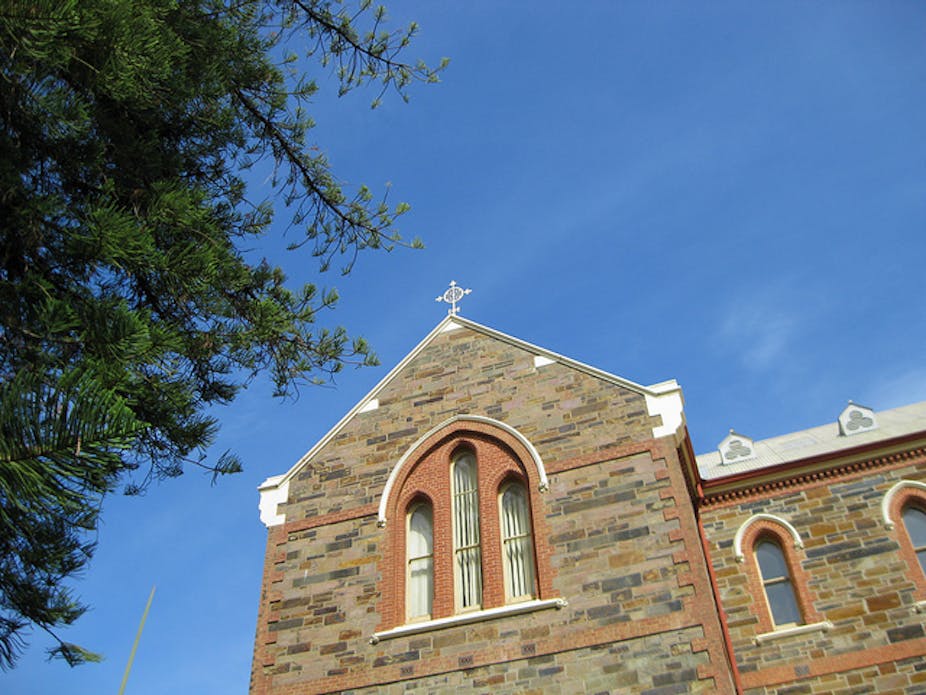Some Victorian principals have taken the decision to axe religious instruction (RI) from their schools. Many believe this move is long-overdue and should be replicated nationwide.
Over the past few years, media reports of extremist teaching or proselytising include: a NSW RI instructor claiming to “cure” homosexuals; children in Queensland RI being taught that humans and dinosaurs lived together; and Victorian RI aimed at “making disciples” because “without Jesus, our students are lost”.
My research has highlighted the divisive implications of RI curriculums that are racist, sexist, anti-science, age-inappropriate or somehow objectionable – even to church-going Christians. Little wonder that some educators are finally coming to terms with their obligation to act – in the interests of Australia’s children; in the interests of education.
Last month, ex-British prime minister Tony Blair noted that religious extremism is “not innate. It is taught … sometimes in the formal education system”. If that is true, then skills to counter religious extremism can also be taught.
Religious extremists reject the idea of human equity. They prefer their religious worldview to democratic institutions, values and processes, and think one religion, theirs, is the best and only framework for society.
Many RI programs in Australia are evangelical and biblically literal. These programs position a narrow, extremist view of Christianity as the superior way to live and believe.
Marion Maddox’s new book, Taking God to School, highlights the potential for RI programs to become part of a wider Pentecostal quest “to create a totalitarian fundamentalist Christian society in Australia” where schools are “training ground(s) for the army of Jesus”.
Most Australians assume we have a secular education system; one where religious extremism does not affect our children. This is naïve. Extremism can emerge from religious radicalisation or scriptural literalism in many contexts. It is not limited to the madrassas of Afghanistan or Indonesia, but is found in schools in suburban Sydney, Melbourne and Brisbane.
My book, Religion in Secular Education, documents how Australia has a policy blind spot regarding RI in state schools. No state education agency effectively oversees what is taught, or by whom. Teachers are not required to be present in RI classes in most schools in Australia.
Instead, RI volunteers are vetted by their own religious organisations. They usually have no formal teacher training. This policy mechanism creates an accountability loophole that enables extremists to target young children.
Adding a volunteer-led ‘ethics’ option, where the providers promise to “never advocate for the removal of RI”, legitimises the presence and power of the extremists.
Many parents are dissatisfied with current RI policies and also with the lack of response to their concerns from Education Departments. Government agencies do not deal with complaints about inappropriate teaching, lack of alternatives or discrimination against those who opt out. In NSW policy, complaints are directed back to the RI provider.
Media reports from Queensland, New South Wales and Victoria show how state education agencies are not equipped to deal with the policy challenge. Alarm bells should be ringing all over the country.
But assumptions that children learn harmless stories, about “Jesus”, “forgiveness”, and the Good Samaritan, appear to assuage any concerns. Politicians, teacher union representatives and parents appear to have been lulled into a 1950s response: “it can’t do any harm”. Meanwhile, extremist religious teaching and preaching, in segregated settings, divides multifaith and no-faith communities.

We should not underestimate the damage that can come from religious division and indoctrination. In Australia, recent national curriculum debates, court cases (federal and state) and government programs that finance Christian evangelism (chaplaincy and state-funded Christian RI for example) do not augur well.
Comments by Kevin Donnelly, an appointed reviewer of the national curriculum, suggest that Christianity’s privileges in education should continue. Donnelly’s Education Standards Institute does not want “Christianity … treated as one religion among many, alongside Buddhism, Confucianism and Islam”.
Defending privilege paves the way for the extremists. Perhaps Australia just isn’t ready to recognise its own, home-grown religious extremism. Or are the educators waking?
Embedded in Australian government and media reports about security and countering religious radicalism is the restrictive idea that extremism emerges in “Muslim communities” with disaffected youth. The implication is that religious extremism is only associated with people of “Middle Eastern appearance”.
Soporific denial is easy. Deep self-examination is more demanding. Whether we recognise it or not, whether we develop policies to address it or not, Christian religious extremism can be a security risk, a risk to the nature of our pluralist democracy and our hard-won liberal freedoms.
Aggressive, highly funded and secretive, the incursion of extreme religious evangelism in Australian schools – public, private and “Christian independent” – should give us pause for thought. For example, the Victorian Department of Education recently found the children’s evangelical organisation, OAC Ministries, operating “outside departmental policy”. It was not authorised to be in the schools.
OAC is an international organisation dedicated to “proclaiming the Gospel of Jesus”, especially to “those outside the church”. In 2013 I was approached by parents who were disturbed OAC ministries had removed children from school grounds for religious programs, claiming parental consent under a “blanket excursion permission form”. Some parents, and even principals, were unaware of the nature of these excursions and would not have provided informed consent. It was a serious breach of child security.
Australian society, and the wider world, is no longer focused on a singular, Christian world view. It’s time to expel unprofessional, segregated and unaccountable RI in state schools. The RI time-slot could be better spent.
To adequately equip our children, we ought to provide them with a comprehensive understanding of different religions and non-religious world views and ethical systems. We ought to teach them how to navigate the real world – which is diverse, religious and non-religious – and how to identify and be careful of extremist views of any kind. Religious extremism can be a dangerous thing, no matter which way it is pointing.

